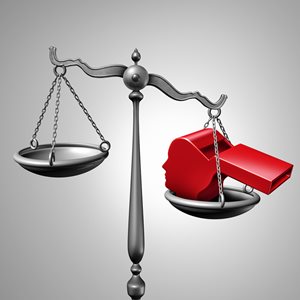Professional Growth
Attorney Whistleblowing: Wrestling With the Ethics Rules
February 13, 2024
Lawyers, as officers of the court and guardians of justice, are held to the utmost degree of integrity, honesty, and ethical standards — particularly when it comes to protecting client confidentiality. So, what happens when attorneys learn of a client’s serious wrongdoing?
and ethical standards — particularly when it comes to protecting client confidentiality. So, what happens when attorneys learn of a client’s serious wrongdoing?
At the D.C. Bar Labor and Employment Law Community program “Lawyers as Whistleblowers: Ethical, Legal, and Practical Considerations” held last month, panelists discussed the challenges that attorneys face in exercising their whistleblower rights while balancing their ethical duties to their client with the duty to report misconduct.
Moderator Kel McClanahan, executive director at National Security Counselors, began with a discussion of D.C. Rule of Professional Conduct 1.13, stating, “The organization is your client, and the employees of the organization are not.” While an organization’s senior leadership (officers, directors, employees, etc.) acts on behalf of the organization, lawyers are ultimately accountable to the organization, McClanahan said.
Amy Richardson, partner at HWG LLP, said lawyers should remember the real purpose of whistleblowing, the ethics rules, and how “discipline has a real impact on your reputation and the status of your license as a lawyer.”
In protecting the organization and reporting waste, fraud, abuse, or illegal conduct, the D.C. Rules of Professional Conduct “do not allow for reporting out but reporting up,” said Erika Stillabower, D.C. Bar senior legal ethics counsel. “Even if something feels like a crisis, you should go up and not out,” she added, underscoring the importance of reporting up the chain of command in an organization and, if needed, to the highest authority that may act on behalf of the organization.
While there are specific times when confidences and secrets must be revealed, lawyers shall reveal only what is reasonably necessary under the Rules. Stillabower noted that lawyers who experience abuse or come under attack from a client shall “reveal the minimum amount possible and are allowed to respond to allegations — you do not have to take abuse.”
In considering the duty to report any waste, fraud, abuse, or illegal conduct outside of the organization, the panelists discussed the interrelationship of the ethics rules and substantive law that mandate reporting. “When you have an obligation to reveal something by law, it trumps all of the ethics rules,” Stillabower said.
During the Q&A session, panelists also addressed a question regarding media disclosures. In weighing whether or not to disclose to the media, exceptions under Rule 1.6 require lawyers to reveal only what is reasonably necessary to protect their client or prevent harm, Stillabower said.
However, Stillabower added, “I cannot picture a situation where the media would be the appropriate place to go.”
Toward the end of the program, panelists encouraged attendees to reach out to the D.C. Bar Legal Ethics Helpline, which offers confidential, informal consultations on ethical issues related to the D.C. Rules.
Tynekia Garrett, a student at Catholic University of America Columbus School of Law, is a D.C. Bar writer in residence for 2023 to 2024.


